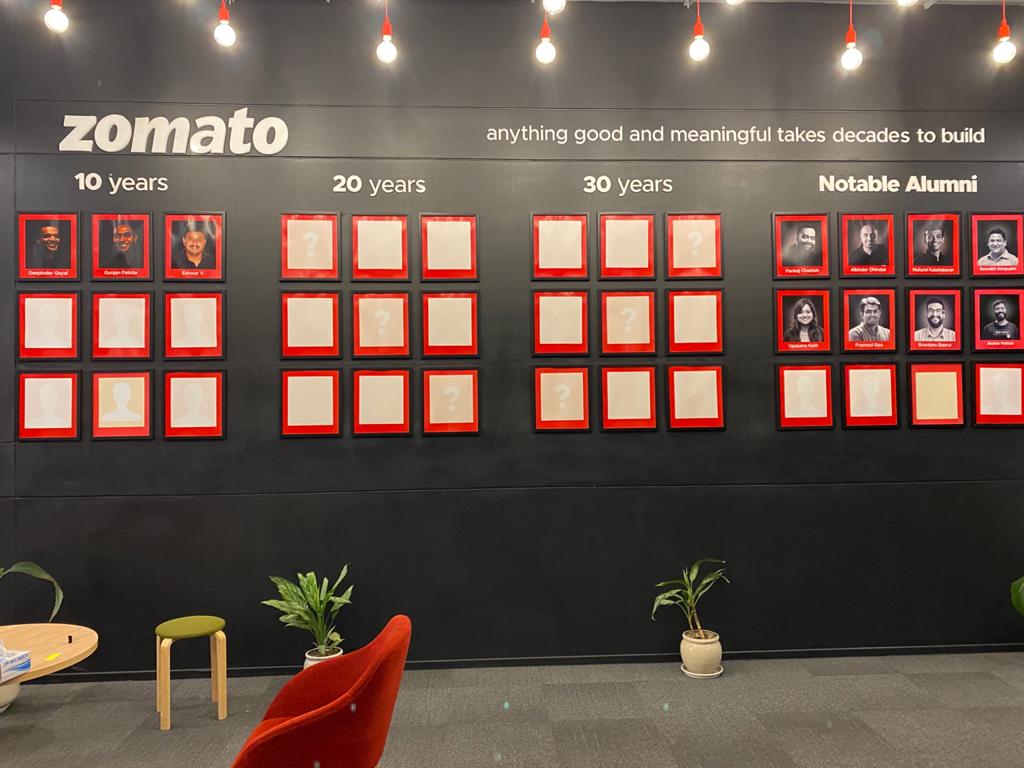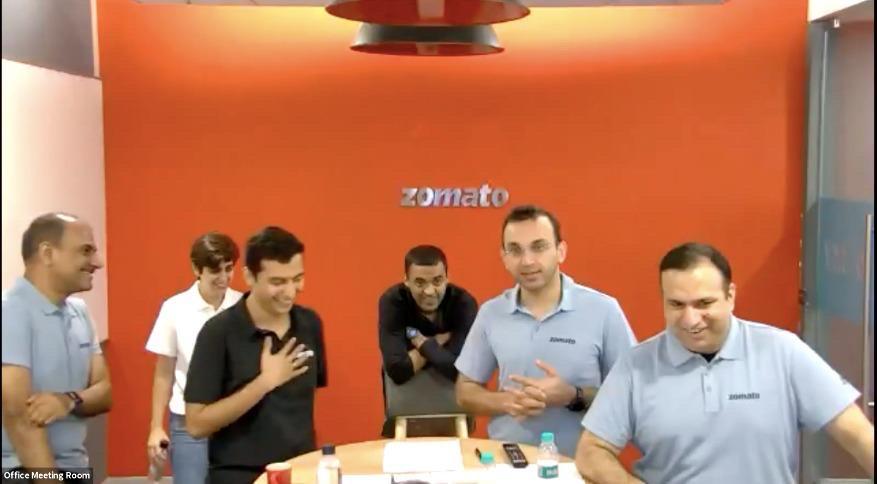Zomato IPO: Re-imagining the Future of Food
Mohit Bhatnagar
Published July 22, 2021

In 2006 Deepinder Goyal decided to upload the menu from Bain’s cafeteria to the company’s intranet to deal with the long lunchtime queues. A few years later, Deepinder and Pankaj Chaddah launched Zomato, a restaurant search and discovery app. Since then, Zomato has evolved into a full stack food transactions platform, powered by a mission to redefine the future of food.
The company’s 13-year journey from idea to IPO has been marked by several misses, many wins and a ton of learning along the way. Two things have remained consistent: the founding team’s laser-sharp focus on building the best possible product, and their insistence that food should remain at the core of their DNA. That clarity of vision, fueled by a mixture of passion, resilience and downright audacity, paved the way for Zomato’s IPO on the Bombay Stock Exchange today.
I first met Deepinder in July 2013, one day before a trip to the US to meet clients to support a fundraise.
Sanjeev Bhikchandani, the founder of Info Edge and an early investor in Zomato, had suggested I meet the company; downloads of their restaurant discovery app were growing. We pulled up to the Zomato farmhouse, which is set on a large, grassy acreage on the outskirts of Delhi, at 8am the next morning (read all about that interesting first interaction here).
The first thing I noticed was a blazing red punching bag hanging on the front porch. It set the tone for the journey we all took together over the subsequent years; aggressive, sometimes bruising – but always building new muscles, while working super hard, to eventually create a resilient and enduring company. The farmhouse is a treasure trove of Zomato memories.
Deepi served up hot coffee and an ambitious slide deck that talked about how Zomato was going to rule the global restaurant discovery world by creating something they called a vertical social network! The business was young ($400k in revenue) and was predominantly built on web traffic, driven by a large in-house content team and there were more iOS users than android. Still, two things stood out in that meeting:
- First, the business was growing quickly on word-of-mouth and organic traffic, with zero marketing. Customers were loving the product.
- Second, an refreshing and audacious vision to win globally, at a time when few Indian startup founders were looking beyond their borders.
I cancelled my US trip right away and requested for a special Sequoia India meeting on the next day, which was a weekend. I figured I was serving our Clients better by staying back to partner with a company led by someone who was arguably India’s best product entrepreneur. In November 2013, Sequoia Capital India led Zomato’s $35 million Series A round, making it one of Sequoia Capital India’s largest investments at that point in time.
Audacity To Dream Big: Zomato’s X factor
Few months after Sequoia Capital India’s investment, I walked into the farmhouse and was greeted by a gigantic poster that boldly stated, “Zomato is Going to Eat Yelp’s Lunch”. Yelp, which pioneered restaurant discovery, had a $4 billion market capitalization at the time. That didn’t intimidate Zomato, which had just acquired Urbanspoon in the US as an entry into the US and Canadian markets.
Long story short, the Urbanspoon acquisition did not work out. But one thing became clear to us: Zomato dared to dream. Zomato was not willing to settle for second place. And, Zomato was not afraid to fail, as long as there was a chance of winning.
Many people later misread their bravado as arrogance. But it’s actually part of the company’s culture and DNA to put a stake in the ground by announcing their most audacious goals. Massive ambition is core to their being. This includes Zomato’s early decision to expand into global markets; to complement its high-margin classifieds business model by aggressively gaining market share in the food delivery market; its subsequent decision to shut down many international markets to focus on India; to get into new initiatives like Zomato Gold (Pro), payments and Hyperpure; to acquire Uber Eats in India. And to publish an annual report with all transparency years before they went public.
Swift and courageous decision making is a trait that deeply resonates within the company.
I was reminded of the importance of “audacity to dream big” just this last week as Deepi drove me to the Farmhouse.
He shared takeaways from an internal leadership meeting where, to this day, one of the most critical roles he plays at Zomato is to urge his team to be fearless, ambitious and long term to stay relevant.
Keeping the focus on food
Zomato’s leadership team went on to re-imagine their business model based on three pillars – delivery, dining out, and sustainability – fueled by a vision of ‘better food for more people’.
Zomato’s thesis is that food consumption is shifting from just home to include restaurants, and there is a unique, once-in-a-lifetime opportunity to fundamentally change the future of food consumption — a future where everybody in the world is eating clean food, no matter where they are, and what they can afford.
This clear vision took Zomato down a different road to other food discovery and delivery companies in India, the US, China. Many industry players look at the business through the lens of logistics and have made last-mile delivery utilization their key metric, thereby branching into many categories like medicine delivery and courier services. Zomato’s founding team made a conscious decision to stay focused on ‘meals consumed’ at the core of their DNA.
Today, customers use Zomato’s platform to discover restaurants, read and write reviews, order food delivery, book a table and make payments while dining out. Zomato provides restaurant partners with marketing tools to acquire and engage customers, and also now operates a one-stop ‘clean food’ procurement solution, called Hyperpure, which supplies restaurants with fresh, high-quality ingredients, like antibiotic residue free chicken, sourced from responsible farmers. Hyperpure restaurant partners are showcased to users, creating a virtuous cycle of demand and supply of clean ingredients in hyperlocal markets across India.
Proving that a sustainable food delivery business can be built in India
When Zomato first ventured into food delivery, many naysayers questioned economics and whether a sustainable business model could be built. The decision to keep food at the core of Zomato’s DNA changed the company’s trajectory as it embraced food delivery.
Over the years, the unit economics of Zomato’s food delivery business have improved consistently. In their recent Annual Report, Zomato reported their contribution margin went from – 47 rupees per order in Q1 FY20 to + 27 rupees per order in Q1 FY21. The underlying unit economics continued to strengthen because:
- the fast-growing base of repeat customers changed their behavior and ordered more frequently,
- not only did people order more frequently, but their order sizes went up,
- the Zomato product team innovated and iterated furiously to bring in efficiencies in the last mile of Zomato’s delivery operations.
The move into positive unit economics marked something of a milestone in India – and busted a few myths too. The first was the
common misconception that startups can either focus on profitability or growth – not both. The best companies manage to do both.
Zomato expanded to new states and new cities across India while improving their unit economics. The company carefully built out sustainable supply (restaurants/dark kitchens) models and delivery capability across small towns in India. Unlike traditional ecommerce, the economics of food delivery benefit from hyperlocal supply as well as demand.
The second myth was that it’s hard to make economics work in a category where the average order value are ~$4-6 (compared to ~$40 in the US). As Zomato extended its reach into every corner of India they changed consumer behavior by encouraging customers to order in more frequently.
It’s been exciting to see the company’s vision of providing more options and more choice to consumers – no matter where they are, and at a price they can afford – start to drive their bottom line.
Doing the right thing
Zomato has always stood for doing things right, and doing the right thing. They’ve pioneered ‘cognitive diversity’ by ensuring women make up 50% of their board; they provide 26 weeks of paid parental leave to both men and women, and period leave to female employees.
Feeding India, Zomato’s not-for-profit foundation, has served over 123 million meals to people in underserved communities in India, and when COVID-19 struck, the foundation partnered with ACT Grants to import badly needed medical supplies, sourcing and delivering thousands of oxygen concentrators to hospitals.
It’s always struck me that Deepinder and his team feel that it’s not enough for Zomato to win – but they want to make a deeper impact on society, and help others win, too.
On behalf of everyone at Sequoia India, I’d like to congratulate Deepinder, his leadership team and all the ‘Zomans’ who have their fingerprints on the journey from idea to IPO. One of the most common phrases used at Zomato is: “1% done”. So while today’s event is an important milestone, I’m sure the team is already cooking up the next disruption to reshape the future of food.
